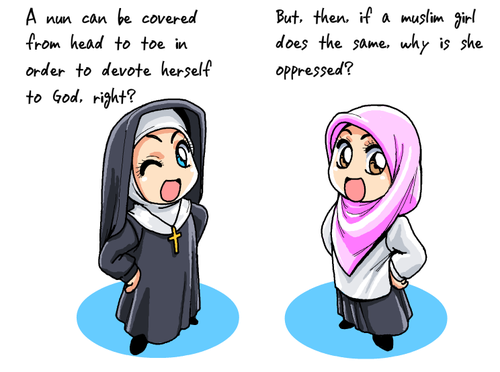The cartoon (I can’t find the source) makes an excellent point:

There’s different views on the Islamic dress for women. Some say it’s very much an oppressive set of clothing that is forced upon women. Now yes, there are cases like that, but you can point to any organized religion and see the very same thing. Shocking, I know, but even in the Christian faith there are examples of oppression. There are also a large number of women within the Islamic faith who willingly wear the hijab, niqab or burka as a proclamation of their faith. Just like Roman Catholic Nuns do. And even within the ranks of the Roman Catholic Church, not all nuns wear the fully covering habit that is often thought of when a nun is discussed.
That may be the big difference. If a nun chooses not to wear a habit, the consequences are virtually non-existent. If a Muslim woman chooses not to wear a cover of some sort, there are many men who share her faith who will look down upon her (or worse). Not all of them, but enough to keep pressure on Islamic women to cover themselves at all costs.
Granted the “banning controversy” focuses on burkas and niqabs (and usually not the hijab seen in the cartoon), I think there’s certainly a different perception of the two.
Are there other similarities or differences?
(via The Daily (sort of) Adventures of Tim and Zodi)



It’s Moving Day for the Friendly ..."
It’s Moving Day for the Friendly ..."
It’s Moving Day for the Friendly ..."
It’s Moving Day for the Friendly ..."